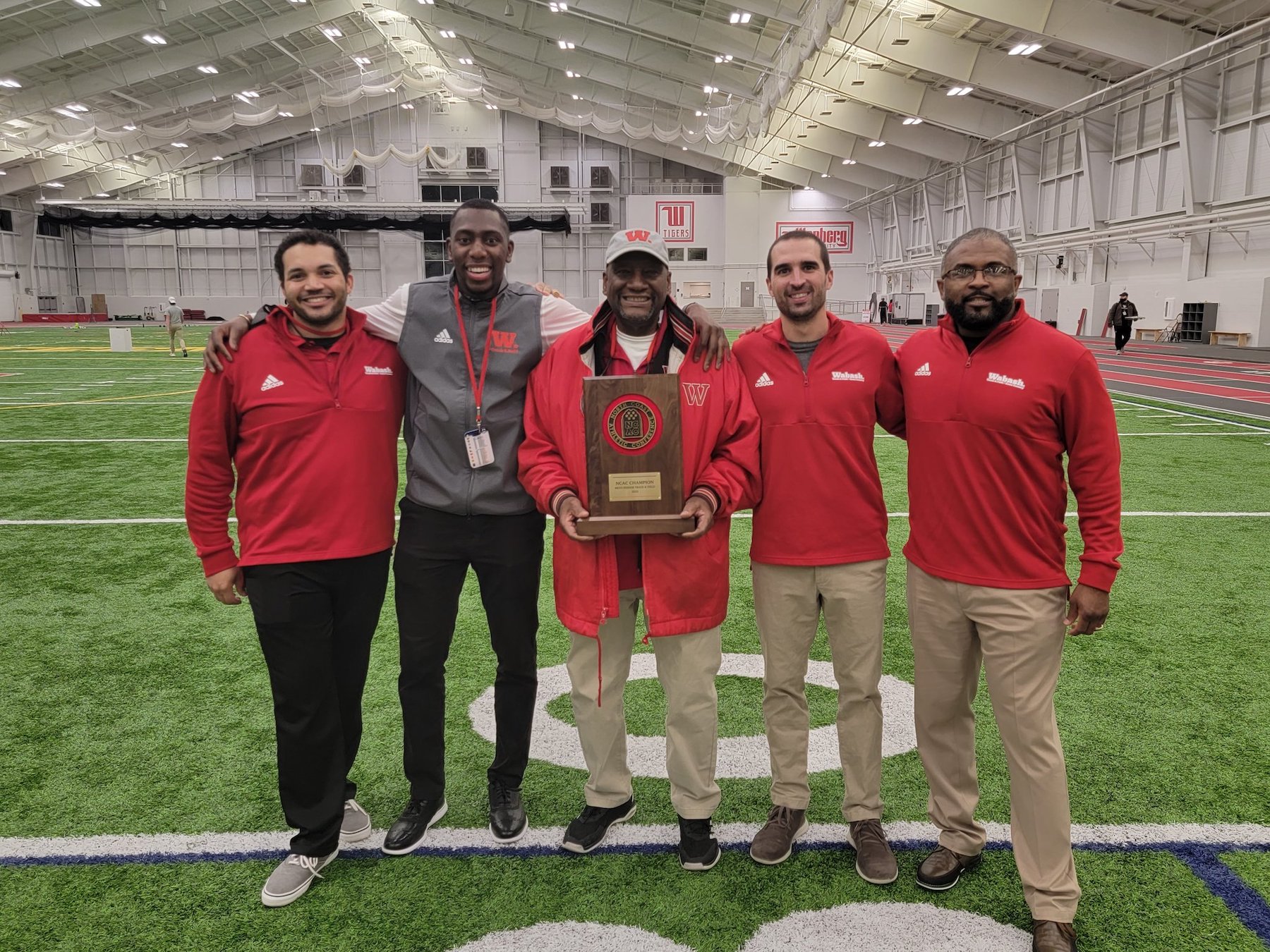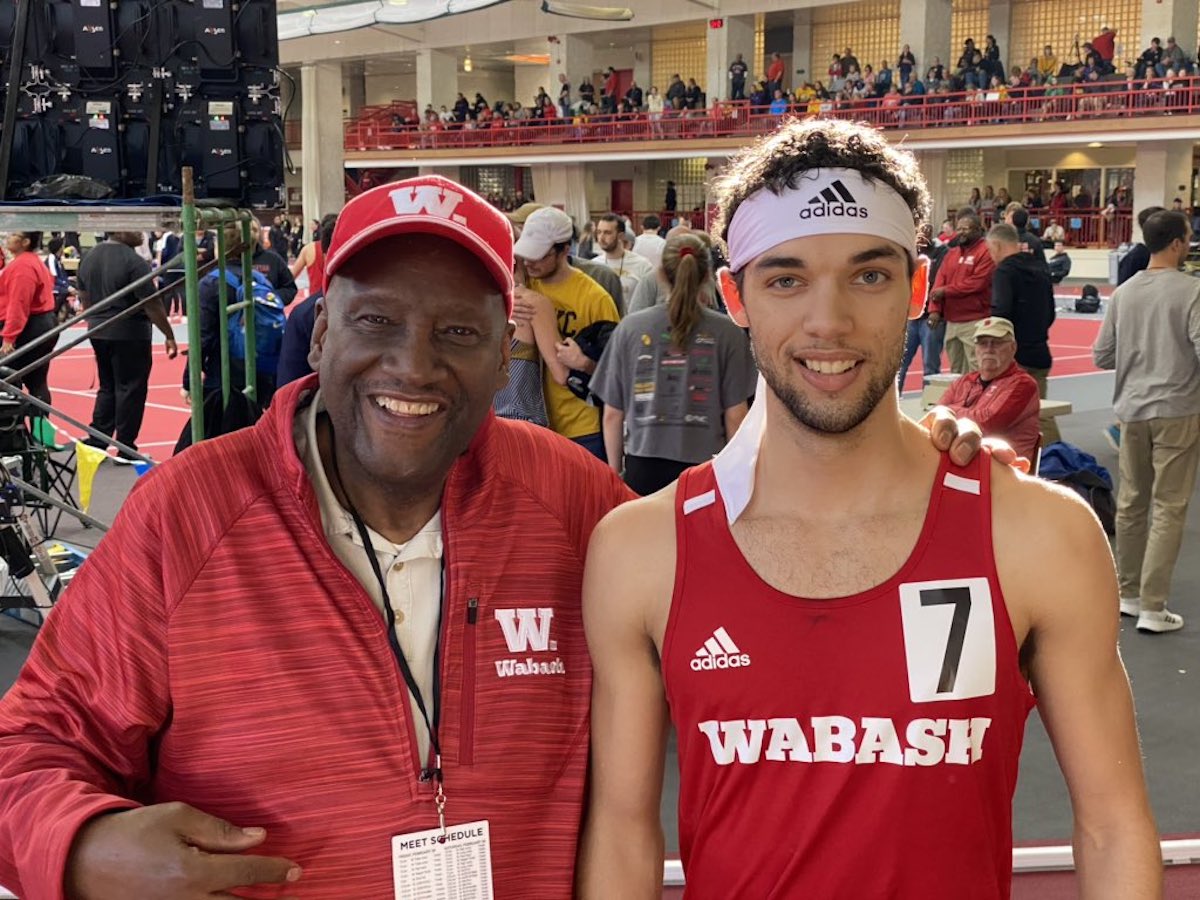After 37 years of coaching at Wabash, Robert H. Johnson H’77 may have retired in 2008, but he certainly hasn’t slowed down or shied away from the opportunity to serve as a mentor.
“Coach Johnson has brought people together for more than 50 years,” Clyde Morgan, head track and field coach and Malcolm X Institute of Black Studies (MXIBS) assistant director, said of the College’s first-ever Black head coach who joined staff in 1971.
“Wabash College wouldn’t be what it is today without him.”
 When he’s not visiting campus to attend events or checking in on students at the MXIBS, you’ll often find the Hall of Famer on the sidelines at track and cross country practices and meets. Whether it’s on campus or on the road, Johnson volunteers his time to cheer on and build up the student-athletes, all while taking notes and offering wise advice to coaches.
When he’s not visiting campus to attend events or checking in on students at the MXIBS, you’ll often find the Hall of Famer on the sidelines at track and cross country practices and meets. Whether it’s on campus or on the road, Johnson volunteers his time to cheer on and build up the student-athletes, all while taking notes and offering wise advice to coaches.
“He loves the program, and wants it to be in the best place possible,” said Tyler McCreary, who joined Wabash staff in 2018 as head cross country coach and associate head track and field coach. “From the start, Coach Johnson showed a confidence and trust in me just like he has with the other coaches.
“He is always around and has done a phenomenal job of sitting back and allowing Coach Morgan, myself, and the other assistant coaches to run the thing. He lets us take the lead and allows us to do things the way we want to do them, and then he chimes in whenever he feels like it’s needed,” McCreary said.
“That’s what I’ve enjoyed about him and appreciated over the years. The fact that he’s embraced that,” he said. “It's very difficult for someone who's been in the game for as long as he has to take the backseat. But Coach Johnson is very willing to do that, and that’s a huge piece of what makes him a great coach and a great mentor.”
Family Comes First
McCreary, Morgan, John Bute and Emile Conde all call Johnson their mentor. Not only has the former U.S. Olympic coach helped them all grow as coaches at Wabash, but also in their personal lives as men.
Morgan remembers the first conversation he had with Johnson when he came to campus in 2008 to interview for the coaching job. The two were taking a walk inside Knowling Fieldhouse. The conversation started with improving the program, which had only had two head coaches lead it since World War II.
By the time they got around to the first loop, that focus shifted.
“We started talking about our family and life, and keep in mind I had just met the man,” Morgan said. “He told me later in the interview, after he sat in on some sessions, ‘If you get this job or not, I need to tell you something because I picked up on the type of coach you are. Keep doing what you’re doing, but don’t spend more time with other people’s kids than your own.’
“Coach Johnson always tells me, ‘Do this because I didn’t do this,’ specifically when it comes to family. He opens his heart and admits where he made mistakes as a father while coaching over the years, and what he wished he would have done with his own kids. He really helped me understand how hard it is to be a coach’s kid and a coach’s wife.”
One of the greatest compliments Johnson gave Morgan came five years later in 2013 when the College was hosting a clinic in the fieldhouse. Without him knowing, Johnson snapped a picture of Morgan’s little three-year-old daughter drawing on a dry erase board next to her father as he was writing out demos, drills and workouts.
“That was just normal to me and my wife, Jennifer, when she was coaching basketball at Thiel College. We always brought our kids with us to be around our teams during practice and on campus,” Morgan said. “When Johnson showed me that picture about two weeks later, he said, ‘This is what I’m talking about. That’s the difference. You involve your kids. It’s so important to keep involving our families.’
“Those have been our conversations. We do talk about track-technical things, but that’s rarer honestly,” the head track and field coach said. “It’s a lot of life stuff, and how to develop young people.”
Developing Young People
One of those young people includes Bute, an assistant track and field and assistant football coach for the Little Giants, who joined the Wabash staff in August 2020 at the height of the COVID-19 pandemic.
From the get-go, Bute said Johnson has been there to support him.
“When I started working at Wabash, I remember the first time Coach Johnson came up to me with his ‘Wabash Always Fights’ mask, and the first thing he did was show me these make-shift devices that he built for throwers to help them with training. He said, ‘I have these just in case you want them. Let me know if you need anything,’” Bute said.
“I would say that's just the epitome of how he's been with me. Every time I see him it’s, ‘How are things going? How are you feeling? Life good? How can I help you,” Bute explained. “It’s all about the culture with Coach Johnson. He’s incredibly nice to everyone he meets, which just blows my mind when thinking about how old he is and how many kids he’s worked with over time.
“He has this very nuanced, kind of old-school way of coaching. It’s built around the fundamentals of having true compassion and energy for people. Coach Johnson does that every day, every time he interacts with our staff and students.”

Watching Johnson interact with the students has also been very fulfilling for Conde, assistant track and field coach (jumps/multi-events) who joined the coaching staff in 2018.
“Everybody loves Coach Johnson, and it’s always a great practice when he’s around because the students listen to what he as to say. They look up to him and pay attention because they know when this guy is speaking, he knows what he’s talking about,” Conde said.
“And he makes it fun. He’s always laughing and making jokes,” he said. “If somebody’s nervous he notices it and makes an effort to be there for them. Then you’ll see them smiling and laughing later because he got them out of that head space. He pushes students out of their comfort zones.”
One of the greatest lessons Conde said Johnson has taught him over the years is the importance of continuing to learn.
“You can’t just be so stuck in your own ways because you’ll never improve,” Conde said. “Coach Johnson taught me what it takes to develop our student-athletes. It’s about them growing, not just as an athlete, but as a person first and athlete second. That takes patience and perseverance.”